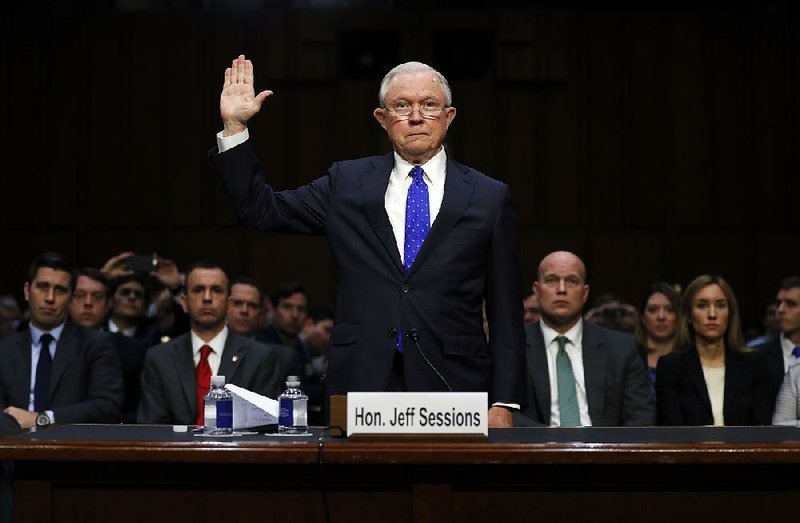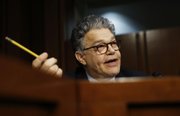WASHINGTON -- Attorney General Jeff Sessions on Wednesday defended President Donald Trump's firing of FBI Director James Comey but declined to discuss private conversations with the president about the dismissal, frustrating Democratic lawmakers who asked pointed questions meant to link Comey's firing to a broader inquiry into Russian election meddling.
The repeated, often-testy questioning about the Russia investigation at a Senate Judiciary Committee hearing -- coming as Sessions spearheads changes to the Justice Department in the areas of lesbian, gay, bisexual and transgender rights; criminal justice; and immigration -- underscored the extent to which the Russia investigation continues to shadow Sessions even though he recused himself months ago.
Sessions told the judiciary panel at the outset of his first oversight hearing as attorney general that he would not answer any questions about conversations with the president that he considered confidential.
He largely adhered to that principle during the five-hour hearing, refusing to say what Trump told him about his reasons for wanting to fire Comey, whether Trump confided in him his concern about "lifting the cloud" of the Russia investigation and whether he had asked Sessions to drop a criminal case against former Sheriff Joe Arpaio in Arizona.
Sessions deflected the questions by maintaining that presidents are entitled to have private discussions with Cabinet secretaries, saying at one point, "I do not confirm or deny the existence of any communication between the president that I consider to be confidential."
Sessions' defense of the Comey firing -- and his insistence that it stemmed from the handling of the Hillary Clinton email server case -- was consistent with the initial explanation by the White House. It was, he said, "the first time I'm aware of" in which an FBI director had performed the traditional role of Justice Department prosecutors by announcing on his own the conclusion of a federal investigation -- that no charges would be lodged against Clinton.
He said he was further galled when Comey, shortly before his firing, insisted to Congress that he would have taken the same actions again.
"That was a fairly stunning event for both of us, and it did highlight the problem more significantly than it had been before," Sessions said, referring to Deputy Attorney General Rod Rosenstein.
[INTERACTIVE TIMELINE: Events leading up to Comey’s firing]
Trump took to Twitter on Wednesday to revive his long-standing complaint about the FBI's handling of the Clinton email probe, alleging that Comey had protected the Democratic presidential nominee by prematurely "exonerating" her before the 2016 election.
"Comey stated under oath that he didn't do this -- obviously a fix?" Trump wrote. "Where is Justice Dept?"
Trump's comments came in response to the FBI's release of heavily blacked-out draft statements by Comey from May 2016, in preparation for closing the Clinton investigation without criminal charges.
Trump tweeted that the draft statements, the existence of which was previously known, show that the FBI had exonerated "Crooked Hillary Clinton" long before the investigation was complete. He tweeted: "James Comey lied and leaked and totally protected Hillary Clinton. He was the best thing that ever happened to her!"
[PRESIDENT TRUMP: Timeline, appointments, executive orders + guide to actions in first 200 days]
In interview excerpts released in August by the Senate Judiciary Committee, FBI officials said Comey and investigators had determined by the spring of 2016 that charges weren't warranted and had begun thinking of how the public should be informed of that decision.
Clinton was interviewed by the FBI in early July, just days before Comey announced the investigation's conclusion. That timing has prompted criticism that FBI leadership had prejudged the conclusion before completing the investigation.
Although Sessions refused to say Wednesday whether he and Trump discussed Comey's involvement in the Russia investigation, he said the president had asked him and Rosenstein for their recommendations about what to do with Comey.
But that explanation has been muddled by Trump himself, who days after the May 9 firing said he would have fired Comey even without the Justice Department's recommendation and that he was thinking of "this Russia thing" when he dismissed him.
The circumstances of Comey's firing are among many things being investigated by Robert Mueller, who was appointed as the Justice Department's special counsel to look into whether the Trump campaign coordinated with Russia to influence the outcome of the 2016 election. After initially balking at the question, Sessions said Mueller's investigative team had not approached him for an interview.
DISAGREEMENTS ARISE
The hearing marked a return to the Judiciary Committee for Sessions, who served on it for years as a Republican senator.
Yet Sessions' interactions with his former peers have been frayed as attorney general, particularly after Democratic accusations that he provided misleading testimony at his confirmation hearing about his contacts with a Russian ambassador.
He argued Wednesday with Sen. Al Franken, D-Minn., who accused him of having moved the "goal post" in his denials about his contacts with the ambassador.
Apart from Russia, Sessions faced questions from lawmakers about his undoing of Barack Obama-era protections for gay and transgender people, among other changes he has made in the nine months since taking office.
Franken praised Sessions' decision to send an experienced federal hate-crimes prosecutor to assist in a transgender murder case in Iowa, but he said the Justice Department has "demonstrated an unrelenting hostility toward LGBT people," an assertion Sessions disputed.
The attorney general this month issued a memo opining that Title VII of the Civil Rights Act of 1964 does not protect transgender people from workplace discrimination, and his Justice Department came down on the side of a Colorado baker who refused to bake a cake for a gay couple's wedding. Civil-liberties advocates say his recent memo offering guidance on religious freedom essentially amounts to a license for discrimination.
Since taking office, Sessions has tried to pressure so-called sanctuary cities into cooperating with federal immigration authorities by threatening to withhold grant money, and he was the public face of the Trump administration's decision to end a program benefiting hundreds of thousands of illegal aliens who entered the U.S. as children. Congress is seeking a legislative solution to extend the protections before recipients' work permits expire.
At the hearing, Sessions tussled with Sen. Richard Durbin, D-Ill., over whether people living in the country illegally are driving Chicago's gun violence. The city has drawn the Trump administration's scrutiny for refusing to help immigration authorities detain and deport illegal aliens. Durbin said he wanted Chicago officers to do community policing and not immigration work.
"How does that make the city of Chicago safer when you don't remove criminals who are illegally in the country?" Sessions said.
In his opening remarks, Sessions defended Trump's travel ban, which bars various types of travelers from Syria, Libya, Iran, Yemen, Chad, Somalia, North Korea and Venezuela, saying it could help prevent terror attacks in the United States. He called the directive -- which was blocked by two federal judges Tuesday and Wednesday -- an "important step" in the fight against terror.
"It's a lawful, necessary order that we are proud to defend," Sessions said, adding, "We are confident we'll prevail, as time goes by, in the Supreme Court."
He said military leaders had told him to expect an "increase in attacks" as the Islamic State is pushed out of strongholds in Syria and Iraq.
Information for this article was contributed by Eric Tucker and Sadie Gurman of The Associated Press and by Matt Zapotosky and Sari Horwitz of The Washington Post.
A Section on 10/19/2017

